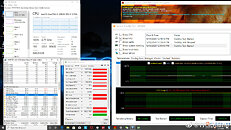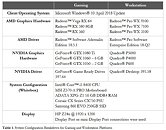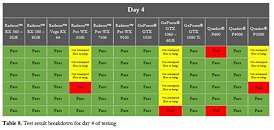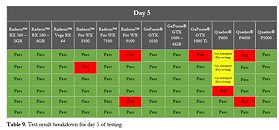Mar 26th, 2025 03:35 EDT
change timezone
Latest GPU Drivers
New Forum Posts
- The TPU UK Clubhouse (25953)
- HalfLife2 RTX Demo Is out! (321)
- What's your latest tech purchase? (23401)
- Has anyone tried enabling FSR 4 on NVIDIA cards? (15)
- TUF 5090: How do these HWiNFO voltages look? Also what is "GPU Unknown Rail (10) Voltage"? (3)
- What features do you want to see in a first person survival horror game? (34)
- Throttlestop undervolt asus tuf f15 i5-10300H NEED HELP UNCLEWEBB (2)
- Looking for a squared USB-C display with specific dimension to replace the default display of the HackBerry Pi Zero. (13)
- Did Nvidia purposely gimp the performance of 50xx series cards with drivers (59)
- Is RX 9070 VRAM temperature regular value or hotspot? (193)
Popular Reviews
- Assassin's Creed Shadows Performance Benchmark Review - 30 GPUs Compared
- be quiet! Pure Rock Pro 3 Black Review
- ASUS ProArt X870E-Creator Wi-Fi Review
- ASRock Radeon RX 9070 XT Taichi OC Review - Excellent Cooling
- Pulsar Feinmann F01 Review
- Sapphire Radeon RX 9070 XT Nitro+ Review - Beating NVIDIA
- ASUS GeForce RTX 5070 TUF OC Review
- ASRock Phantom Gaming B860I Lightning Wi-Fi Review
- AMD Ryzen 9 9950X3D Review - Great for Gaming and Productivity
- AMD Ryzen 7 9800X3D Review - The Best Gaming Processor
Controversial News Posts
- AMD RDNA 4 and Radeon RX 9070 Series Unveiled: $549 & $599 (260)
- AMD Radeon RX 9070-series Pricing Leaks Courtesy of MicroCenter (158)
- MSI Doesn't Plan Radeon RX 9000 Series GPUs, Skips AMD RDNA 4 Generation Entirely (142)
- Microsoft Introduces Copilot for Gaming (123)
- AMD Radeon RX 9070 XT Reportedly Outperforms RTX 5080 Through Undervolting (118)
- NVIDIA Reportedly Prepares GeForce RTX 5060 and RTX 5060 Ti Unveil Tomorrow (115)
- Over 200,000 Sold Radeon RX 9070 and RX 9070 XT GPUs? AMD Says No Number was Given (100)
- NVIDIA GeForce RTX 5050, RTX 5060, and RTX 5060 Ti Specifications Leak (96)
News Posts matching #Stability
Return to Keyword Browsing
NVIDIA Investigating Reported GeForce RTX 5090 & 5080 Black Screen & Stability Issues
Unlucky owners of problematic GeForce RTX 5090 and RTX 5080 graphics cards have posted feedback across various online community sites. Press outlets started to take notice of these documented issues soon after the launch of NVIDIA's debut wave of "Blackwell" GPUs. PC Gamer has "kept track" of reports relating to black screens and miscellaneous failures—the site published an investigative article late last week, following user feedback "hitting critical mass" across Reddit and Team Green's own forum. A request for comment was sent over to NVIDIA HQ; PC Gamer received a brief response. A company spokesperson confirmed that their team is: "investigating the reported issues with the RTX 50-series."
Several PC hardware community members have documented their troubleshooting experiences—the most common suggestion involves downshifting from a PCIe 5.0 connection to 4.0, on the PEG-16 graphics port. Unfortunately, this step did not resolve black screen issues for certain owners—a member of the buildapc subreddit explored a wide array of troubleshooting channels. They re-installed Windows 11 (23H2), adjusted BIOS settings, experimented with monitor connections, and played around with drivers. Best results were produced by connecting a single monitor to their MSI GeForce RTX 5090 GAMING TRIO OC's DisplayPort, with nothing else hooked up to the other ports (DP and HDMI). They suspect that Team Green's GPU drivers could be the source of frustrations; corroborated by a recent VideoCardz news piece. In addition, the 572.16 driver is reportedly affecting "certain GeForce RTX 40-series." A smaller number of owners have discussed a "bricking" of cards; VideoCardz believes that China-exclusive GeForce RTX 5090D models are suffering the most. Manli will be analyzing a "bricked" unit at its service center, in the near future. Colorful did not reply with a comment on the situation.
Several PC hardware community members have documented their troubleshooting experiences—the most common suggestion involves downshifting from a PCIe 5.0 connection to 4.0, on the PEG-16 graphics port. Unfortunately, this step did not resolve black screen issues for certain owners—a member of the buildapc subreddit explored a wide array of troubleshooting channels. They re-installed Windows 11 (23H2), adjusted BIOS settings, experimented with monitor connections, and played around with drivers. Best results were produced by connecting a single monitor to their MSI GeForce RTX 5090 GAMING TRIO OC's DisplayPort, with nothing else hooked up to the other ports (DP and HDMI). They suspect that Team Green's GPU drivers could be the source of frustrations; corroborated by a recent VideoCardz news piece. In addition, the 572.16 driver is reportedly affecting "certain GeForce RTX 40-series." A smaller number of owners have discussed a "bricking" of cards; VideoCardz believes that China-exclusive GeForce RTX 5090D models are suffering the most. Manli will be analyzing a "bricked" unit at its service center, in the near future. Colorful did not reply with a comment on the situation.
Thermal Grizzly Releases Duronaut High-Performance Thermal Paste with Exceptional Long-Term Stability
Thermal Grizzly's Duronaut thermal paste stands out due to its combination of exceptional long-term stability and excellent thermal conductivity. Its outstanding performance in heat transfer is further enhanced by the ability to apply Duronaut in an extremely thin layer. This is made possible by its unique composition of aluminium microparticles and zinc oxide nanoparticles, optimized for particle shapes and sizes. These features ensure excellent adhesion of the paste to the surface. The powders are mixed into a specially developed silicone oil, resulting in extraordinary long-term stability.
For optimal application, the high-end thermal paste comes with the new TG Spatula Pro. The redesigned spatula allows for more pressure to be applied to the surface during application, enabling the paste to be spread more efficiently in a thinner layer. Duronaut is available in 2-gram and 6-gram packaging options.
For optimal application, the high-end thermal paste comes with the new TG Spatula Pro. The redesigned spatula allows for more pressure to be applied to the surface during application, enabling the paste to be spread more efficiently in a thinner layer. Duronaut is available in 2-gram and 6-gram packaging options.
Super Flower Unveils Powerful and Innovative Leadex III ATX 3.1 Product Line
Super Flower, a leader in high-performance power supply units (PSUs), is thrilled to announce the launch of a full product lineup that extends beyond their renowned PSUs. This comprehensive expansion includes air coolers, water coolers, case fans, and chassis, aiming to provide PC enthusiasts with a broader range of components that deliver both performance and aesthetic appeal. The new products are designed to meet the diverse needs of gamers, content creators, and tech enthusiasts who seek reliable, high-quality solutions for their custom builds.
Leading the lineup is the Leadex III ATX 3.1, available in 650 W, 750 W, 850 W, 1000 W, and 1300 W configurations. This PSU exemplifies Super Flower's commitment to excellence, offering unmatched performance, efficiency, and safety for even the most demanding systems. Its advanced features cater to gamers and power users alike, ensuring stability and reliability under intense loads.
Leading the lineup is the Leadex III ATX 3.1, available in 650 W, 750 W, 850 W, 1000 W, and 1300 W configurations. This PSU exemplifies Super Flower's commitment to excellence, offering unmatched performance, efficiency, and safety for even the most demanding systems. Its advanced features cater to gamers and power users alike, ensuring stability and reliability under intense loads.

Intel "Arrow Lake" and "Lunar Lake" Are Safe from Voltage Stability Issues, Company Reports
Intel's 13th and 14th generation processors, codenamed "Raptor Lake" and "Raptor Lake Refresh," have been notoriously riddled with stability issues over the past few months, up until Intel shipped the 0x129 microcode update on August 10 to fix these issues. However, the upcoming Intel Core Ultra 200 "Arrow Lake" and 200V series "Lunar Lake" processors will not have these issues as the company confirmed that an all-new design is used, even for the segment of power regulation. The official company note states: "Intel confirms that its next generation of processors, codenamed Arrow Lake and Lunar Lake, are not affected by the Vmin Shift Instability issue due to the new architectures powering both product families. Intel will ensure future product families are protected against the Vmin Shift Instability issue as well."
Originally, Intel's analysis for 13th—and 14th-generation processors indicated that stability issues stemmed from excessive voltage during processor operation. These voltage increases led to degradation, raising the minimum voltage necessary for stable performance, which Intel refers to as "Vmin shift." Given that the design phase of new architectures lasts for years, Intel has surely anticipated that the old power delivery could yield problems, and the upcoming CPU generations are now exempt from these issues, bringing stability once again to Intel's platforms. When these new products launch, all eyes will be on the platform's performance, but with a massive interest in stability testing from enthusiasts.
Originally, Intel's analysis for 13th—and 14th-generation processors indicated that stability issues stemmed from excessive voltage during processor operation. These voltage increases led to degradation, raising the minimum voltage necessary for stable performance, which Intel refers to as "Vmin shift." Given that the design phase of new architectures lasts for years, Intel has surely anticipated that the old power delivery could yield problems, and the upcoming CPU generations are now exempt from these issues, bringing stability once again to Intel's platforms. When these new products launch, all eyes will be on the platform's performance, but with a massive interest in stability testing from enthusiasts.

Intel Ships 0x129 Microcode Update for 13th and 14th Generation Processors with Stability Issues
Intel has officially started shipping the "0x129" microcode update for its 13th and 14th generation "Raptor Lake" and "Raptor Lake Refresh" processors. This critical update is currently being pushed to all OEM/ODM partners to address the stability issues that Intel's processors have been facing. According to Intel, this microcode update fixes "incorrect voltage requests to the processor that are causing elevated operating voltage." Intel's analysis shows that the root cause of stability problems is caused by too high voltage during operation of the processor. These increases to voltage cause degradation that increases the minimum voltage required for stable operation. Intel calls this "Vmin"—it's a theoretical construct, not an actual voltage, think "speed for an airplane required to fly". The latest 0x129 microcode patch will limit the processor's voltage to no higher than 1.55 V, which should avoid further degradation. Overclocking is still supported, enthusiasts will have to disable the eTVB setting in their BIOS to push the processor beyond the 1.55 V threshold. The company's internal testing shows that the new default settings with limited voltages with standard run-to-run variations show minimal performance impact, with only a single game (Hitman 3: Dartmoor) showing degradation. For a full statement from Intel, see the quote below.

MSI Closely Monitoring Intel 14th/13th Gen Stability Issues, To Release Firmware Updates in August
Regarding the recent Intel Core 13th/14th Gen Core desktop processor instability, MSI has worked closely with Intel to understand the situation and is closely monitoring the progress. We will provide the updated BIOS to our customers and users as soon as possible after the new microcode is released in the middle of August. Stay tuned.
Keep checking the Support section of your motherboard's product page on the MSI website for UEFI firmware updates, or use the MSI Center utility.
Keep checking the Support section of your motherboard's product page on the MSI website for UEFI firmware updates, or use the MSI Center utility.

Intel Statement on Stability Issues: "Motherboard Makers to Blame"
A couple of weeks ago, we reported on NVIDIA directing users of Intel's 13th Generation Raptor Lake and 14th Generation Raptor Lake Refresh CPUs to consult Intel for any issues with system stability. Motherboard makers, by default, often run the CPU outside of Intel's recommended specifications, overvolting the CPU through modifying voltage curves, automatic overclocks, and removing power limits.
Today, we learned that Igor's Lab has obtained a statement from Intel that the company prepared for motherboard OEMs regarding the issues multiple users report. Intel CPUs come pre-programmed with a stock voltage curve. When motherboard makers remove power limits and automatically adjust voltage curves and frequency targets, the CPU can be pushed outside its safe operating range, possibly causing system instability. Intel has set up a dedicated website for users to report their issues and offer support. Manufacturers like GIGABYTE have already issued new BIOS updates for users to achieve maximum stability, which incidentally has recent user reports of still being outside Intel spec, setting PL2 to 188 W, loadlines to 1.7/1.7 and current limit to 249 A. While MSI provided a blog post tutorial for stability. ASUS has published updated BIOS for its motherboards to reflect on this Intel baseline spec as well. Surprisingly, not all the revised BIOS values match up with the Intel Baseline Profile spec for these various new BIOS updates from different vendors. You can read the statement from Intel in the quote below.
Today, we learned that Igor's Lab has obtained a statement from Intel that the company prepared for motherboard OEMs regarding the issues multiple users report. Intel CPUs come pre-programmed with a stock voltage curve. When motherboard makers remove power limits and automatically adjust voltage curves and frequency targets, the CPU can be pushed outside its safe operating range, possibly causing system instability. Intel has set up a dedicated website for users to report their issues and offer support. Manufacturers like GIGABYTE have already issued new BIOS updates for users to achieve maximum stability, which incidentally has recent user reports of still being outside Intel spec, setting PL2 to 188 W, loadlines to 1.7/1.7 and current limit to 249 A. While MSI provided a blog post tutorial for stability. ASUS has published updated BIOS for its motherboards to reflect on this Intel baseline spec as well. Surprisingly, not all the revised BIOS values match up with the Intel Baseline Profile spec for these various new BIOS updates from different vendors. You can read the statement from Intel in the quote below.
Dragon's Dogma 2 Devs Investigating PC Performance & Stability Issues
To all Dragon's Dogma 2 players. We would like to update you on the status of the following items, about which we have received numerous comments from the community. To all those looking forward to this game, we sincerely apologize for any inconvenience.
Regarding Frame Rate
A large amount of CPU usage is allocated to each character and calculating the impact of their physical presence in various areas. In certain situations where numerous characters appear simultaneously, the CPU usage can be very high and may affect the frame rate. We are aware that in such situations, settings that reduce GPU load may currently have a limited effect; however, we are looking into ways to improve performance in the future.
Regarding Frame Rate
A large amount of CPU usage is allocated to each character and calculating the impact of their physical presence in various areas. In certain situations where numerous characters appear simultaneously, the CPU usage can be very high and may affect the frame rate. We are aware that in such situations, settings that reduce GPU load may currently have a limited effect; however, we are looking into ways to improve performance in the future.

Intel Core i9-13900K and i7-13700K Gaming Stability Issues Linked to Power Limit Unlocks
Users of Intel's 13th Gen unlocked K-series processors such as Core i9-13900K, i7-13700K, are reporting stability issues when gaming even at stock clock-speeds. Hassan Mujtaba of Wccftech and Tom's Hardware have isolated the issues to power limit unlocks. Most Z690 and Z790 chipset motherboards include BIOS-level unlocks for the power limits, particularly the Maximum Turbo Power (interchangeable with PL2). By default, the i9-13900K and i7-13700K come with a PL2 value of 253 W, but you can get the motherboard to unlock this to unlimited, which basically tells the processor that it has 4096 W of power on tap, so not technically a "stock" configuration anymore.
Of course, neither your PSU nor your CPU VRM are capable of delivering 4096 W, and so the processor tends to draw as much power as it needs, to maintain the best possible P-core boost frequencies, before running into thermal limits. At stock frequencies with stock boost bins, unlocked power limits can drive the power draw of i9-13900K as far high as 373 W under a multithreaded load, in our testing, when compared to 283 W with the power limits in place. It turns out, that unlocking the power limits can come with long-term costs, besides the literal cost of electricity—the processor's stability with gaming workloads can degrade with certain hardware combos and settings.
Of course, neither your PSU nor your CPU VRM are capable of delivering 4096 W, and so the processor tends to draw as much power as it needs, to maintain the best possible P-core boost frequencies, before running into thermal limits. At stock frequencies with stock boost bins, unlocked power limits can drive the power draw of i9-13900K as far high as 373 W under a multithreaded load, in our testing, when compared to 283 W with the power limits in place. It turns out, that unlocking the power limits can come with long-term costs, besides the literal cost of electricity—the processor's stability with gaming workloads can degrade with certain hardware combos and settings.

AMD Improves Stability and Frame-pacing of Fluid Motion Frames Preview Driver
AMD over the past months has been releasing periodic updates to its Fluid Motion Frames preview drivers. These are off-trunk drivers that serve to demonstrate the capabilities of Fluid Motion Frames (FMF), a technology that enables near-doubling of frame-rates for every game, through interpolation techniques, similar to what you find in consumer televisions. The tech works on DirectX 12 and DirectX 11 games, on Windows 10 and Windows 11 machines, and for Radeon RX 7000 series and RX 6000 series GPUs. The December 7th update is based on the Adrenalin 23.12.1 drivers (i.e. includes all changes and improvements AMD introduced with those drivers), plus enablement for FMF, although the driver isn't WHQL certified. With this release, AMD says that it introduced several application stability improvements for FMF. The company also reduced stutter and improved frame-pacing. Grab the driver from the link below.
DOWNLOAD: AMD Fluid Motion Frames Preview Driver—December 7 Update
DOWNLOAD: AMD Fluid Motion Frames Preview Driver—December 7 Update

MSI Releases New AGESA PI 1.0.0.7c BIOS Update for Higher Frequency Memory Modules and Stability Bug Fixes
MSI, today, released a new AMD AGESA PI 1.0.0.7c BIOS update for all MSI's motherboard X670E, X670, B650, A620 product line. For this new BIOS release, MSI focus on and prioritize mainly for higher DDR5 memory module support and also stability bug fixes. The latest update has huge significant increase for supported memory frequency on AMD Ryzen CPUs. Below is a list of models that will be ready at the time of the release while other models will have come support in the following week.
In the screenshots below, demonstrates running a Memory Stress Test, on an AMD Ryzen R7 7700X CPU with a paired of dual-channel DDR5-7200 MHz "EXPO" certified kit on MSI's PRO B650-P WIFI Motherboard will run without any stability issues. Moreover, it also demonstrates running a Memory Stress Test on an AMD Ryzen R9 7900X CPU with MSI's MEG X670E ACE Motherboard can even achieve 8000 MHz (CL36) high frequency. A few more updates specifically on the AGESA 1.0.0.7c added extra for protection for reliability than before and also patched a few potential vulnerabilities and security loopholes.
In the screenshots below, demonstrates running a Memory Stress Test, on an AMD Ryzen R7 7700X CPU with a paired of dual-channel DDR5-7200 MHz "EXPO" certified kit on MSI's PRO B650-P WIFI Motherboard will run without any stability issues. Moreover, it also demonstrates running a Memory Stress Test on an AMD Ryzen R9 7900X CPU with MSI's MEG X670E ACE Motherboard can even achieve 8000 MHz (CL36) high frequency. A few more updates specifically on the AGESA 1.0.0.7c added extra for protection for reliability than before and also patched a few potential vulnerabilities and security loopholes.
The Last of Us Part I Gets New v1.0.5.1 Patch
Naughty Dog and Iron Galaxy have released the v1.0.5.1 Patch for the PC version of The Last of Us Part 1, bringing general and AMD GPU stability improvements, and fixing issues seen with all Intel Arc GPUs.
According to the rather short release notes, the newest update brings general stability improvements, fixes crashes on boot that were seen on all Intel Arc GPUs, as well as brings stability improvements for some AMD GPUs during an extended playthrough. Naughty Dog was keen to note that they are still closely watching for reports to support future improvements and patches, as well as actively optimizing, working on game stability, and implementing additional fixes that will be included in future updates.
According to the rather short release notes, the newest update brings general stability improvements, fixes crashes on boot that were seen on all Intel Arc GPUs, as well as brings stability improvements for some AMD GPUs during an extended playthrough. Naughty Dog was keen to note that they are still closely watching for reports to support future improvements and patches, as well as actively optimizing, working on game stability, and implementing additional fixes that will be included in future updates.
OCCT Celebrates 20 Years of Stability Testing, Shares Thank You Message and Giveaway
2003 : WHEN IT ALL STARTED - OCCT started as a project when I was an exchange student in Oklahoma, USA, back in 2003. Everything began following a conversation on ICQ about verifying overclocking builds sent to a database. This led me to implement the first CPU test of OCCT, and building a GUI around it. Despite being only launched on forums, OCCT was quickly spread through the overclocking community, and climbed in popularity very quickly.
2004 - 2009 : YOU PLAY FOR FUN, I DEV FOR FUN
I returned back to France, living in Lille, then Douai, and I started working as a System administrator. OCCT became a hobby - something I would work on during evenings. Some people were doing raids on World of Warcraft - I was coding and releasing OCCT in my free time. I started pumping more features in OCCT : Linpack, test reports, the 3D standard test... the latter got me into the headlines when it revealed a design flaw in AMD's flagship GPU at the time : Radeon HD4870. This led AMD to issue a response: they called OCCT a "Power virus," as if it was a malicious program. I still hear that today.
2004 - 2009 : YOU PLAY FOR FUN, I DEV FOR FUN
I returned back to France, living in Lille, then Douai, and I started working as a System administrator. OCCT became a hobby - something I would work on during evenings. Some people were doing raids on World of Warcraft - I was coding and releasing OCCT in my free time. I started pumping more features in OCCT : Linpack, test reports, the 3D standard test... the latter got me into the headlines when it revealed a design flaw in AMD's flagship GPU at the time : Radeon HD4870. This led AMD to issue a response: they called OCCT a "Power virus," as if it was a malicious program. I still hear that today.

ASRock Releases New BIOS for AM5 Motherboards System Stability
The recent escalating AMD Ryzen 7000X3D Series CPU issue has come to our attention, ASRock treats this type of incident seriously and would like to offer the most updated BIOS across our entire range of AM5 motherboards. ASRock has released new BIOS as well as A-Tuning utility for following AM5 chipset motherboards which limit CPU voltage on certain power rails. We encourage users to update to the new BIOS with the appropriate voltage settings urgently to ensure system stability and durability.
Apart from bringing rock-solid hardware products to PC users, ASRock is also keen on working with AMD and integrating the most up to date technologies into its products. If you're unsure about the risk of using old BIOS version, please seek professional support from ASRock customer service.
Apart from bringing rock-solid hardware products to PC users, ASRock is also keen on working with AMD and integrating the most up to date technologies into its products. If you're unsure about the risk of using old BIOS version, please seek professional support from ASRock customer service.
Hogwarts Legacy Gets a New Big Patch
Avalanche Software has released the latest March 8 patch for Hogwarts Legacy, that fixes various bugs and improves gameplay, performance, and stability. The extensive update also includes fixes for online, gameplay, audio, UI, cinematics, ray tracing, save game, display and miscellaneous issues.
The changelog includes major reworks, from patching out memory leaks, improved VRAM usage, to VFX crashes, lighting optimizations with NVIDIA drivers, improved stability and performance with ray tracing, directional light shadows and shadows on trees with ray tracing, various Ansel issues, and plenty of gameplay issues, including missions, broom flight, world events, and characters. The new patch also updates the minimum Nvidia and AMD graphics driver recommendations, which could be directly connected to the improved VRAM usage, as the game was easily going over 14 GB with RT enabled on 1080p, 1440p, and 2160p resolutions.
The changelog includes major reworks, from patching out memory leaks, improved VRAM usage, to VFX crashes, lighting optimizations with NVIDIA drivers, improved stability and performance with ray tracing, directional light shadows and shadows on trees with ray tracing, various Ansel issues, and plenty of gameplay issues, including missions, broom flight, world events, and characters. The new patch also updates the minimum Nvidia and AMD graphics driver recommendations, which could be directly connected to the improved VRAM usage, as the game was easily going over 14 GB with RT enabled on 1080p, 1440p, and 2160p resolutions.

NVIDIA Releases Game Ready 456.55 WHQL Driver With Improved Stability of RTX 3000 Series Cards, Support for Star Wars: Squadrons
NVIDIA has today released the latest iteration of its Game Ready driver with the version number 456.55. Marked as a WHQL release, the driver is supposedly going to bring new advancements to the stability of the latest GeForce RTX 3000 series Ampere graphics cards. While the release notes don't officially mention anything on how it improves, it is already confirmed by a few Redditors that the new driver removes crashed experienced with the past version 456.38. In the latest revision, the support has been added for NVIDIA Reflex in Call of Duty: Warzone and Call of Duty: Modern Warfare, as well as support for Star Wars: Squadrons game. Below is the link to the driver download page redirecting to NVIDIA's site, and in no time the TechPowerUp download page will be updated as well.DOWNLOAD:NVIDIA GeForce 456.55 WHQL Game Ready Drivers
The change-log follows:
The change-log follows:

Intel Core i9-10900K Stressed, Package Power Reads 235W, Temperatures 93°C
A stock Intel Core i9-10900K 10-core processor was subjected to FPU stress by Chinese PC enthusiast @WolStame. The power and temperature values of the processor are inside HEDT territory. With a Furmark GPU stress running on the side, under AIDA64 FPU stress, the i9-10900K measured a package power draw of up to 235.17 W, as measured using HWInfo64. The CPU package temperature shot up to 93 °C. A 240 mm AIO liquid CPU cooling solution was used in the feat. Interestingly, the processor is able to sustain clock speeds of 4.77 GHz, which is close to the advertised 4.80 GHz all-core turbo boost frequency, called for by the multi-core FPU stress.
To show that the values weren't obtained in a few seconds of test, the AIDA64 Stability Test window keeps a timestamp log and displays time elapsed into the stress. In this particular case, the all-core stress has been running for close to 48 minutes; and yet the processor is keeping up with its advertised all-core boost speed, making this an impressive feat.
To show that the values weren't obtained in a few seconds of test, the AIDA64 Stability Test window keeps a timestamp log and displays time elapsed into the stress. In this particular case, the all-core stress has been running for close to 48 minutes; and yet the processor is keeping up with its advertised all-core boost speed, making this an impressive feat.

NVIDIA Outs GeForce Hotfix 445.98 Drivers to Fix Overwatch Stability Issues & other Major Bugs
NVIDIA rolled out the GeForce software 445.98 Hotfix drivers. The Hotfix was released to expeditiously correct glaring bugs with the GeForce software. The 445.98 Hotfix improves Overwatch stability, resolves F1 2019 crashes, fixes driver installation on the Colorful GeForce GTX 1650, improves HDR in some games, and includes various other bug fixes. The drivers are otherwise identical to GeForce 445.87 software released earlier this week. Grab the drivers from the link below.
DOWNLOAD: NVIDIA GeForce 445.98 Hotfix
DOWNLOAD: NVIDIA GeForce 445.98 Hotfix

QA Consultants Determines AMD's Most Stable Graphics Drivers in the Industry
As independent third-party experts in the software quality assurance and testing industry for over 20 years, QA Consultants has conducted over 5,000+ mission-critical projects and has extensive testing experience and depth in various industries. Based in Toronto, Ontario, QA Consultants is the largest on-shore software quality assurance company, with a 30,000 sq. ft., industry-grade facility called The Test Factory.
Mar 26th, 2025 03:35 EDT
change timezone
Latest GPU Drivers
New Forum Posts
- The TPU UK Clubhouse (25953)
- HalfLife2 RTX Demo Is out! (321)
- What's your latest tech purchase? (23401)
- Has anyone tried enabling FSR 4 on NVIDIA cards? (15)
- TUF 5090: How do these HWiNFO voltages look? Also what is "GPU Unknown Rail (10) Voltage"? (3)
- What features do you want to see in a first person survival horror game? (34)
- Throttlestop undervolt asus tuf f15 i5-10300H NEED HELP UNCLEWEBB (2)
- Looking for a squared USB-C display with specific dimension to replace the default display of the HackBerry Pi Zero. (13)
- Did Nvidia purposely gimp the performance of 50xx series cards with drivers (59)
- Is RX 9070 VRAM temperature regular value or hotspot? (193)
Popular Reviews
- Assassin's Creed Shadows Performance Benchmark Review - 30 GPUs Compared
- be quiet! Pure Rock Pro 3 Black Review
- ASUS ProArt X870E-Creator Wi-Fi Review
- ASRock Radeon RX 9070 XT Taichi OC Review - Excellent Cooling
- Pulsar Feinmann F01 Review
- Sapphire Radeon RX 9070 XT Nitro+ Review - Beating NVIDIA
- ASUS GeForce RTX 5070 TUF OC Review
- ASRock Phantom Gaming B860I Lightning Wi-Fi Review
- AMD Ryzen 9 9950X3D Review - Great for Gaming and Productivity
- AMD Ryzen 7 9800X3D Review - The Best Gaming Processor
Controversial News Posts
- AMD RDNA 4 and Radeon RX 9070 Series Unveiled: $549 & $599 (260)
- AMD Radeon RX 9070-series Pricing Leaks Courtesy of MicroCenter (158)
- MSI Doesn't Plan Radeon RX 9000 Series GPUs, Skips AMD RDNA 4 Generation Entirely (142)
- Microsoft Introduces Copilot for Gaming (123)
- AMD Radeon RX 9070 XT Reportedly Outperforms RTX 5080 Through Undervolting (118)
- NVIDIA Reportedly Prepares GeForce RTX 5060 and RTX 5060 Ti Unveil Tomorrow (115)
- Over 200,000 Sold Radeon RX 9070 and RX 9070 XT GPUs? AMD Says No Number was Given (100)
- NVIDIA GeForce RTX 5050, RTX 5060, and RTX 5060 Ti Specifications Leak (96)



































